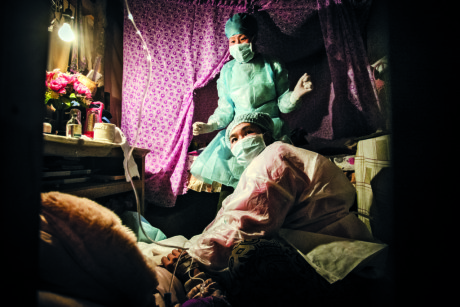UHC financing and the structural causes of poverty
On by Natalie Sharples
How can we turn ‘Universal Health Coverage’ (UHC) into reality?

We all support the aspiration to achieve ‘Universal Health Coverage’ (UHC) – who could possibly argue against a world in which everybody has access to the high quality health services they need, without incurring financial hardship? The problem is how we can possibly turn such a lofty ambition into reality.
The scale of the challenge is daunting. Recent figures from the World Health Organisation show that for low-income countries (LICs), the annual cost of meeting the UHC targets set out in the Sustainable Development Goals (SDGs) by 2030 would be $112 per person – significantly higher than the commonly-cited figure of $86. This would leave LICs short of around $35 billion per year. The World Health Organisation estimates that LICs will need to spend up to 20% of GDP on health in order to bridge this gap – but instead of going up, public funding for health actually stagnated between 2000-2014 in these countries. To add to this, the targets laid out by the SDGs wouldn’t even provide truly universal health coverage- to do that would cost a lot more.
So where can we find the funding? For low and middle-income countries to make real progress towards UHC, there needs to be a big change to current global economic policies. These policies currently deprive many countries of essential financial resources. For example, World Bank statistics show that governments of sub-Sahara African countries paid $18 billion in external debt service in 2015; and lost a further £34.4 billion through the repatriation of profits by multinational companies.
Even more money is lost through global tax avoidance and abuse each year; around $600-$650 billion, or 25% of corporate tax revenues to be precise. A Tax Justice Network study found that the profit shifting of US-headquartered multinationals resulted in a loss of around $130 billion in 2012 – more than ten times what it was two decades ago.
Tax is such an important source of income for many governments, and for low and middle-income countries it makes up around 70% of the overall government budget. Corporate income tax is a very important part of that revenue, but it is clear from recent leaks, including the Panama Papers (2016) and Paradise Papers (2017), that illicit tax behaviour is a serious problem on a very large scale.
If we want to ensure everyone has access to healthcare, high-income countries must take responsibility for corporations headquartered on their territory which avoid tax and breach the rights of citizens living in LMICs. To do this we need global transparency, so everyone can see the key pieces of economic and tax information for these companies, and who their owners and beneficiaries are.
There are also other ways in which the existing global political economy works to deprive low and middle-income countries of revenue – not least the significant financial impacts of unfair trade policies. If we don’t address these structural factors, then UHC will remain a worthy, but unattainable, aspiration.
This is a shortened version of the blog we wrote with the Tax Justice Network for the UHC day UHC Coalition blog series. You can find the full blog, along with others in the series, below.
Read the full blog

